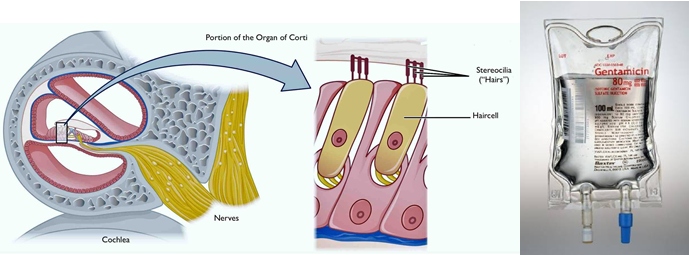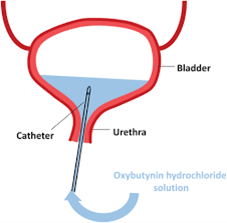A male client has been receiving the antibiotic gentamicin sulfate IV piggyback every 12 hours for several days. Which observations by the nurse indicate that the client may be experiencing an adverse effect of gentamicin?
Hearing has decreased.
Decreased blood urea nitrogen.
White blood cells count 6,000/mm3 (6x109/L).
Reports of photophobia.
The Correct Answer is A
Gentamicin sulfate is an aminoglycoside antibiotic that can cause ototoxicity, which is damage to the inner ear leading to hearing loss or balance problems. Therefore, a decrease in hearing is an indication that the client may be experiencing an adverse effect of gentamicin.
Option b, decreased blood urea nitrogen, is not an adverse effect of gentamicin, but it may indicate improvement in kidney function, which can be a positive outcome of treatment.
Option c, a white blood cell count of 6,000/mm3 (6x109/L), is within the normal range and is not necessarily an adverse effect of gentamicin.
Option d, photophobia, is not a common adverse effect of gentamicin and may indicate a different condition or medication effect.

Nursing Test Bank
Naxlex Comprehensive Predictor Exams
Related Questions
Correct Answer is B
Explanation
Nitrofurantoin is an antibiotic commonly used to treat urinary tract infections. One of the adverse effects of nitrofurantoin is diarrhea, which may be severe and watery. Therefore, it is important for the home care nurse to inform the client that the diarrhea may be a side effect of the medication and requires further evaluation. The nurse should instruct the client to stop taking the medication and contact their healthcare provider for further assessment and treatment. The nurse should also assess the client's fluid and electrolyte status and monitor for signs of dehydration.
Option a is important to consider, but it does not address the potential adverse effect of the medication.
Option c may be appropriate in some cases, but it is not the priority intervention at this time.
Option d is not necessarily true and may cause unnecessary alarm to the client.

Correct Answer is C
Explanation
Oxybutynin is a medicine used to treat symptoms of an overactive bladder. One of the side effects of oxybutynin is that it can cause dry mouth, constipation, and dry skin21. These side effects can increase the risk of dehydration. Additionally, oxybutynin can cause flushing and heat stroke. Therefore, it is important for the client to take measures to avoid dehydration and over-heating while training for a marathon.

Whether you are a student looking to ace your exams or a practicing nurse seeking to enhance your expertise , our nursing education contents will empower you with the confidence and competence to make a difference in the lives of patients and become a respected leader in the healthcare field.
Visit Naxlex, invest in your future and unlock endless possibilities with our unparalleled nursing education contents today
Report Wrong Answer on the Current Question
Do you disagree with the answer? If yes, what is your expected answer? Explain.
Kindly be descriptive with the issue you are facing.
